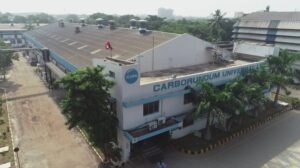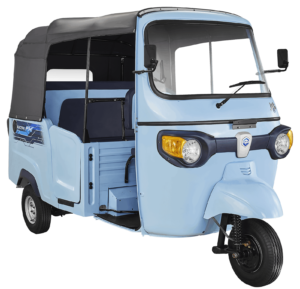In the early years of independence, the Murugappa Group under the chaimanship of Sir Arcot Ramaswami Mudaliar as Chairman and A M M Murugappa Chettiar on the lead, established a number of light engineering units. In collaboration with Tube Investments of U K, T I Cycles of India was set up to manufacture bicycles; bicycle parts under Brampton Fittings, saddles under Wright Saddles of India, steel tubes from Tube Products of India, bicycle chains from TI Diamond Chain and dynamos from T I Miller were set up.
These ensured production of high quality bicycles with the familiar brand names of Hercules, Phillips and BSA. Carborundum Universal with US collaboration emerged a leader in coated and bonded abrasives. For close to two decades of the 1950s and 1960s, these recorded a high rate of growth.
Murugappa Chettiar, ably assisted by his brother A M M Arunachalam and his late brother AMM Vellayan’s son, M V Arunachalam, spearheaded this massive expansion. They were also represented in the boards of several large companies like Ashok Leyland.
M V Arunachalam grabbed the opportunity offered by the departing British owners and acquired the two centuries’ old EID Parry, which pioneered among other things, the production of sanitaryware, sugar, confectionery…in this part of the country. This paved the way for expanding massively fertilizer production at Coromandel Fertilizers, which was earlier set up in collaboration with Chevron Chemicals. This prized acquisition was a landmark for the group’s strident growth. The Murugappas did not hesitate to sell Parrys Confectionery which was so popular, hiving off the sanitaryware business to Roca or even selling the iconic TIAM House shifting to the historic Dare House at Parrys Corner.
Even while expanding the core units, updating technology, rearing a strong team of professional managers and seizing emerging opportunities for growth, the group entered into financial services including insurance. The group can take credit for rearing top class professionals several of whom are leaders in the financial sector with their own businesses.
The spree of expansion continues with successive generation: While M V Subbiah widened the engineering business, M A Alagappan spearheaded diversification into financial services. A Vellayan focused on agriculture. Coromandel Fertilizers, under his lead, recorded massive expansion. M M Murugappan, closely involved with the IIT-M Research Park, has been providing the thrust for expansion into emerging hi-tech businesses.
There have been efforts at keeping pace with technological developments: a significant initiative is the setting up of the IIT Monash Academy as a collaborative effort of Coromandel International, IIT-Bombay and Monash University, Australia, to focus on agricultural research.
Vellayan Subbiah worked on the acquisition of CG Power which has been recording phenomenal growth under the group’s finance veteran N Srinivasan.
The Murugappa clan has been well endowed with quality leadership in successive generations. The earlier thrust provided for expansion through acquisition has been continued to great effect. We present a report on the aspects of this evolution. -With in puts from Vijaya Durga and Dr Narayanan Krishnan
|
FORAY INTO 3-WHEELER EVs… “FIVE YEARS FROM now, no new two-wheeler internal combustion (IC) engine, powered with liquid fuel, will be sold in this country,” predicted Vellayan Subbiah, Chairman, Cholamandalam Investment & Finance & MD-TII while addressing a webinar on electric vehicles organised by the Chennai International Centre. Excerpts from his address.
We see a lot of opportunity in three-wheelers with an average run of 120 km/day. Batteries are being capacitated for about 120-150 km. The space is thus designed for electric vehicles that will take-off fairly quickly as a productive asset. Things around EVs will happen more rapidly than thought. EVs are productive and consumptive. But a lot of development is needed. With the right policies of the government, a massive ecosystem is being developed. Today the quality of batteries, motors, controllers… for EVs is not on par with China’s. So, Chinese dependence would be initially there. Once volumes pick up it’ll go away. I am a bit peeved that e-bicycles are left out. We sell a non-subsidised e-bicycle for Rs 20,000, significantly cheaper than electric two-wheelers. It is manoeuvrable, like other two-wheelers. If the government offers subsidies for e-bicycles, it’ll really make a difference. It’ll cut down the number of electric two-wheelers sold at much higher prices! I feel disruptors are going to be at advantageous for us, through funding start-ups in the EV segment. |
Acquisitions – the driving force
Last year, Tube Investments Ltd., the flagship company of the group, floated a new subsidiary, TI Clean Mobility. This was a bit of a surprise to long-time followers of the group; because, for long, Murugappas have not been known to get into a completely new business—the group has preferred adjacencies.
The only mobility the group had been into was cycles, with well-known brands such as BSA and Hercules. Unlike elsewhere in the world, the cycle is a commute vehicle in India that hardly qualifies to be called ‘clean mobility,’ a term that connotes electric vehicles. TI had indeed tried out electric two-wheelers a decade back, but the market was not ready for them yet.
In time, TI Clean Mobility has made its intentions loud and clear, announcing that it would invest Rs 200 crore to set up a facility to manufacture electric 3-wheelers. The vehicle, christened Montra, is to be launched in both passenger and cargo versions by September.
This was a smart move. Most experts agree that electrification of mobility will start with commercial 3-wheelers, followed by personal 2-wheelers and then heavy commercial vehicles. E-cars would come last. There is a ready market for electric 3-W, as the operating economics are clearly favourable. In 2021-22, the number of 3-W sold was 384,215, of which electric 3-W accounted for 47 per cent (179,725 units). The broking company, Motilal Oswal, in a recent analysis of TI, put the addressable market for electric 3-W at 636,000 (domestic) and 502,000 (exports). TI Clean Mobility will start with a capacity of 75,000 vehicles a year.

A tectonic shift in strategy
The words “first mover advantage” are revealing. Keep aside ‘clean mobility’ for a moment. The foray into a wholly new business viewed in conjunction with a string of acquisitions the group has made in the recent past, especially in 2021-22, cues a major shift in the group’s approach to business. Even in the past, the group had expanded its business by acquisitions. But not since the acquisition of EID Parry in 1981 (the company, incepted in 1788, set up India’s first sugar factory in 1842), with which the group ambled into fertilizers and sugar, has the group tempted into ‘sunrise sectors.’ We have not seen the group rush into IT, telecom, energy, e-commerce … each of which was the fancy of the economy at some point in time. The group had acquired mostly adjacent businesses eg Eastern Abrasives, Sterling Abrasives, Cutfast Abrasives, Godavari Fertilizers, Bharat Pulverizers…
But now, apparently because there is another generation at the helm, one sees a new-found aggression. Entry into EV space is one example. Stepping into optical lens and medical devices are other examples.
Today, you have Arun Murugappan as the Chairman of TI, Vellayan Subbiah (son of M V Subbiah and grandson of AMM Vellayan Chettiar) is the company’s Managing Director; he also manages the group’s NBFC, Cholamandalam Investment and Finance Company. (Another scion of the group is Arun Alagappan, son of M A Alagappan, the Executive Vice Chairman of Coromandel International Ltd, headed by A Vellayan.)
The shift in strategy is clearly evident. The Murugappa group of today is not averse to looking at new businesses, but is also willing to take bets on emerging technologies. Accordingly, one sees a string of acquisitions of start-ups that are still developing new technologies. A good example is that of Aerostrovilos, a company incubated at IIT-Madras, which is developing a micro gas turbine mounted on a truck that can run on diesel, hydrogen, natural gas or any combination of these . Nobody knows if this idea will fly, but TI was okay with paying Rs 3.46 crore for a 27 per cent stake. Another example is the Rs 8.64 crore purchase of 76 per cent in Moshine Electronics, a company manufacturing camera module for mobile phones. While these two didn’t cost much, it is not as though money is a factor here: Cholamandalam Investment and Finance paid Rs 409 crore for 71.94 per cent stake in Payswiff Technologies, a company engaged in the business of enabling online payment gateway services for e-commerce businesses and provides e-commerce solutions. And, Carborundum Universal paid Rs 115 crore for a 72 per cent share in Pluss Advanced Technologies, a company that is into ‘phase changing chemicals,’ a technology that the world is looking into for energy storage.
As mentioned earlier, the group has always been in the market for takeovers. But in recent times, it has also preyed on stressed assets. Last year alone, the group made six acquisitions; along with the previous year’s major buy CG Power (formerly, Crompton Greaves of the Thapar group), costing Rs 700 crore, through insolvency proceedings. (The company has since been turned around—it made a pre-tax profit of Rs 528 crore, compared with a loss of Rs 117 crore in the year before.)
The mopper-up-in-chief
So, the Murugappa group has turned acquisitions into a fine art. Typically, southern industrial houses, conservative by nature, are shy of acquiring businesses, because of the uncertainties the acquired entity may bring in and worries about cultural fitment. Also, Indian companies that have bought businesses abroad have not all succeeded. You see that from giants like Tata Steel (UK’s Corus), Suzlon (Germany’s Repower), Aban Offshore (Norway’s Sinvest) — there are several examples. But not so, apparently, the Murugappas. From the acquisition of EID Parry decades ago to the more recent CG Power – all have been successful buys.
Same for overseas acquisitions. The group has an impressive record of successful overseas buys, having bought businesses in Russia (Volzhsky Abrasives, in 2007), South Africa (Fosker in 2008 and RHI Refractories in 2013), Chile (Alimtec, 2014), Senegal (Boabab Mining and Chemicals) last year and many more, the group is all over the place. Its only failure was its joint venture in China, Jingri-CUMI. Apparently, even the Murugappas couldn’t handle the Chinese.
|
Murugappa acquisitions in 2021-22 Carborundum Universal
Cholamandalam Investment and Finance Company
Tube Investments of India
Coromandel International
|
Deep, jingling pockets…
Now clearly there is a shift in strategy – from adjacencies to any opportunity; the strategy divides into three distinct prongs that would seed new platforms for long-term growth – existing businesses, venture-capital style buys and private-equity style acquisitions, Vellayan Subbiah told investors.
The group has plenty of cash. The manufacturing companies of the group generated free cash flows of Rs 2693 crore in 2021-22, on top of a whopping Rs 5049 crore in the pandemic-hit 2020-21.
The money has been well-utilised. According to a press release, the group spent Rs 1109 crore on expansion, de-bottlenecking, modernisation and setting up digital infrastructure. Coromandel International has announced it would set up a new 1650-tpd sulphuric acid plant at Visakhapatnam, with an investment of Rs 400 crore.
Apart from business purchases, plentiful cash has enabled the Murugappa group to pay off Rs 939 crore of debt. Today’s debt is just 0.13 per cent of equity, down from 0.23 per cent in 2020-21, giving the group a huge leverage to borrow, if needed. This will come in handy at a time when the group is getting into an unknown territory—electric vehicles.
The EV 3-W are consumer products, requiring branding and sales. The group’s history in branded consumer products has been checkered. Its branded fertilizers are successful, but then fertilizers are commodities that cannot but sell. Its cycles are well-known brands. But on the other hand, branded sugar (Parry’s) is but a small part of the business and the group has exited other consumer facing businesses such as confectionery and sanitaryware.
And now in EV 3-W, the Murugappas will have to deal with brand-driven sales and face stiff competition. This business would require roll-out of sales and service networks and targeted advertising. It has been a long time since Kapil Dev promoted BSA cycles, by riding a borrowed bicycle to rush to the airport and arrive just in time to catch the flight for the following day’s match. The Murugappa group would need to dust this shelved promotion for brand-driven sales and put it to good use. For sure, it has one crucial factor for success—deep, jingling pockets. – R S Sumedh
|
EVs, key to the future… TI Clean Mobility Private Ltd (TICM), a wholly-owned subsidiary of Tube Investments of India Ltd (TIIL) and part of the Murugappa group, will roll out electric three-wheelers by end August. Marketed under the brand of Montra, the e-three-wheelers will be launched pan-India.
According to Arun Murugappan (AM), Executive Chairman, TIIL, the e-three-wheeler market is expected to reach USD 1.7 billion by 2025, making it one of the fastest-growing sectors globally. Both passenger and cargo e-three-wheelers will be launched simultaneously. “We believe that a three-wheeled electric vehicle is not key to the future, it is the future itself.” said AM. For the electric tractor business, TII has acquired a 70 per cent stake, investing Rs 161 crore, in Hyderabad-based Cellestial E-Mobility, which claims to be the first in India to produce an electric tractor. TII’s entry into this space is expected soon. The tractors would be launched under the brand Cellestial Egati. For the farming segment, two variants are being developed to address different power requirements. |
|
E THREE-WHEELER MARKET IN INDIA The country’s three-wheeler EV market notched up a record 45 per cent share in total EV sales in fiscal 2022. India registered electric vehicle retails of over 4 lakh units in 2021-22, around three-fold rise from 134,821 units in 2020-21. Out of this electric three-wheeler recorded sales of around 180,000 units. The Indian EV market is mostly driven by two-wheelers and low-speed three-wheelers sharing together about 90 per cent of the total EV sales – two-wheelers sharing 48 per cent, e-carts (speed less than 25kmph) 45 per cent, with more than 25kmph speed constituted 3 per cent, while four- wheelers were just at 4 per cent. Electric three-wheeler market is largely unorganised in India, most being start-ups or just entering the three-wheeler segment.
Mahindra Electric Mobility Ltd, based in Bangalore, is the largest manufacturer of electric three-wheelers in the country. M&M partnered with Reva Electric Car Company in 2010, eventually becoming Mahindra Electric Mobility. In February 2022, the firm sold 772 three-wheelers, more than a 67 per cent growth over the same period last year. Though YoY sales are down by more than 14 per cent,the company managed to sell 901 units in January 2022. Pune-based small commercial vehicle maker Piaggio Vehicles Pvt Ltd (PVPL) has become the market leader in the electric three-wheeler cargo segment in the first half of FY22. It had gained 55 per cent of the electric 3-wheeler cargo market. Its passenger vehicle Ape E-City FX is quite popular. It has developed institutional and government applications with EV garbage tipper as the first of its kind vehicle for the Swachh Bharat application. With a manufacturing plant at Baramati in Maharashtra, it has an installed annual production capacity of over 380,000 commercial vehicles. Its offerings include India’s most powerful electric 3-wheeler cargo – Ape E-city and Ape E-Xtra. Delhi- based start-up, Euler Motors launched Hi-Load EV, its first electric 3-wheeler in the cargo segment. The company targets revenues of Rs 300 crore for FY23, almost 15 times more than its FY22 revenue. Its operations cover more than 10 cities and already has an order for around 3500 units. Most of its orders come from institutional buyers like Flipkart and Ecom Express. Kinetic Green Energy & Power Solution Ltd is planning to set up a two- and three-wheeler electric vehicle manufacturing unit in Visakhapatnam, Andhra Pradesh. The firm has an electric vehicle manufacturing unit with a production capacity of 6000 vehicles in Ahmed Nagar. Last year, the company launched Kinetic Safar Jumbo, India’s first high-performance electric cargo three-wheeler. Atul Motors introduced “Elite” for the Indian market. In February, Atul Auto registered sales of 143 units of three-wheeler EVs. |

 Almost 70 per cent of TII’s revenue comes from the auto industry. Cholamandalam is looking for funding opportunity and TII for supplies to the auto industry Some of our businesses in the traditional automobile segment are going to become obsolete in the emerging electric world. It became imperative for us to act and not to wait.
Almost 70 per cent of TII’s revenue comes from the auto industry. Cholamandalam is looking for funding opportunity and TII for supplies to the auto industry Some of our businesses in the traditional automobile segment are going to become obsolete in the emerging electric world. It became imperative for us to act and not to wait. The e-three-wheelers are designed and manufactured in-house at the Ambattur plant with a capacity to produce 75,000 units annually at an investment of Rs 200 crore.
The e-three-wheelers are designed and manufactured in-house at the Ambattur plant with a capacity to produce 75,000 units annually at an investment of Rs 200 crore. Top electric three-wheeler manufacturers
Top electric three-wheeler manufacturers